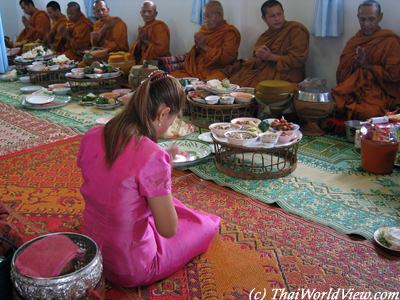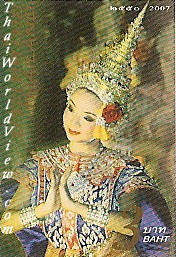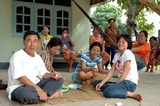

The following concepts are part of Thai everyday life:
Thai people are educated in the family and in school to keep frustration inside. Instead of showing their anger toward a problem or situation, Thai people show "JAI YEN", i.e. calm or patience.
"JAI YEN" concept can be seen when Thai people are standing and waiting for the bus during the hot summer without complaining. To show one's feeling to the others is not valued in Thai society. Respect of the other is highly valued. Especially in up-country villages where everybody knows each other, conflicts are always solved with the help of elderly people or monks. In big cities like Bangkok it is quite different because nobody knows nobody so behaviours are changing.
The sentence "JAI YEN YEN" (ใจเย็นเย็น) is often said when people start to lose control. It means to calm down.
So Thai people keep all their problems inside. Then with no previous warning, like a pressure cooker that explodes, people can act very violently. Thailand is well known for crimes related to love. Many women did cut their husband's sex with a knife because he was infidel. Thailand is supposed to have the best surgeons for these special treatments. Women did know their husband's infidelity but one day they could not support it anymore and acted violently without any previous warning. It is a typical Thai behaviour. An another example happens in 2001 when a German motorcyclist who made an obscene gesture to a van driver was shot dead by the angry motorist.
There is no exterior sign that they are angry. They keep it inside. But they can show it with subtle ways. By refusing or avoiding a direct confrontation with the person, they speak with an animal or with a child making him remarks that are in fact dedicated to the other person. They speak loud enough in order that the concerned person can listen and understand.
"KRENG JAI""is the way that Thai people try to avoid hurting other people's feelings.
The elders shall not be criticized at all. For example professors are highly admired because they represent the knowledge. No students dare to ask a question that could embarrass the teacher. In Thai schools the pupils learn lessons by rote repetition. So there are not educated in a way of changing things, of innovating. There are still conservationists in Thailand and some Thai artists were obliged to withdraw their paintings due to conservationists threats.
"KRENG JAI" concept is also valid for monks. During summer 1998, there was a problem with a monk, who did make a Buddha statue that was not conforming to the Buddhist rules. Same things for art creation, especially for religious arts, there is not a total freedom. Students learning abroad bring to Thailand westerner ways of working, thinking.
An important thing in everyday life is "SANUK". Thai people love to have fun together. "SANUK" can represent many things : eat together, to be with friends and chat, to go out with friends. For Thai people "SANUK" happens with several persons. When coming back from business, Thai people often ask "was it fun ?" (สนุกไหม) before "was it successful ?".

|
Going together to the waterfall is always very funny.
Bring food, beer, ice cubes, guitar and play in the fresh water. |
| Waterfall |
|---|
In Thailand, the group is more important than the individual. It is linked to Thailand's agriculture-based culture. An individual belongs to a group, such as family, institute or social class. These groups dictate who you are, what you are entitled to, how important you are, and so on. If you do not belong to a group, you are nobody. Hence, the key is to maintain relationships with others. We have to be careful not to harm any relationship with the group.
Open and direct criticism is not valued in Thai society. One should flatter about the good qualities instead of saying direct critics. Many foreign bosses did confront such problems in Thailand. For example after harsh critics, some employees have pretended to have a sudden headache or their grandmother have died suddenly. They never came back in the office. Criticism in front of others employees is not a right thing because if Thai people lose face in front of other people they might seek revenge.
Thai people always wish to help. Sometimes when looking for a place, it is a good idea to ask Thai people. Even if they don't know, they indicate a direction. They would lose face if they say they don't know their country.
Thai people can use "MAI PEN RAI" for important or minor issues. Something important from a foreigner point of view can be seen minor from a Thai point of view.
Thai people use "MAI PEN RAI" to avoid making other people feel bad. Most of the time, "MAI PEN RAI" is a response to a problem. For example, a staff member forgets to bring a report to his manager. This report is not urgent. The staff member will be able to bring it in the afternoon. The manager will say "MAI PEN RAI. Bring it later this afternoon".
The first likely reason why Thais are so "MAI PEN RAI" lie in the interpretation of detachment in Buddhism. Thai people control their feelings by not allowing their face to show any frustration. They keep them inside to make society harmonious.
Food takes an important part in Thai life. Thai people always talk about it, about next meal.
In Thai society, people in contact ask for favours from time to time. It helps to endorse a relationship. If a Thai people helps another Thai people, it creates dependancies and the possibility of reciprocation in the future if a favor is asked. This value creates personal connections and favouritism in both the private sector and government.
|
Garlands ("DOOK MALAI" - ดอกมาลัย)
are supposed to bring luck. Garlands can be found
everywhere in Thailand. Every driver has got a garland in his car
in order to avoid misfortune.
|

|
| Garlands |
|---|
Thai people are very superstitious. Odd number are supposed to be lucky numbers. Lottery tickets with odd numbers are likely appreciated. The number "9" is supposed to bring good luck. In Thai language number "nine" is closed to the word "rice" and to the word "to enter". So it is an important word of luck, food, improvement. For Buddhist ceremonies such as wedding or new shop settlement, nine monks are always invited. The number "9" is an auspicious number. The number "3" is also an important number because three multiplies three is nine. So in old times there were ceremonies for new born babies on the third day and third month of life.
ข้าว or "KHAO" means "rice". เก้า or "KAO" means "nine". เข้า or "KHAO" means "to enter".
Thailand is said to be a country of individualists. Thai people don't care a lot with social organisation. For example, when going working abroad Thai people must borrow money at high rates. There is no philanthropic organisation that could help them by lending money at low rates. Many children cannot continue their studies due to a lack of money. There is no philanthropic organisation that could help these children. When being adults and working, they would give back the money and it could be used for another child.
Thai drivers behavior (it frequently happens to see a motorcycle, tuk-tuk or even cars driving in the wrong way in order to do a detour) and dirty waterfalls filled of rubbish, broken bottles after a week-end are two examples of Thai indifference.
Greeting somebody ( "WAI" - ไหว้ ) is an important action in Thai society.

|
The way to "WAI" depends on the person you greet. The highest
rank the person is, the deepest and lowest your greeting must be. It is
not like a hand shaking. People don't have to answer to it each time. For
example if a waiter greets the guests, they don't have to answer.
Answering to his greeting is a fault. The waiter would
be embarrassed and would think the guests are kidding him. Younger people
always have to greet first.
|
| Greeting |
|---|
Thai society is changing in contact with westerner civilization. Now hand shakes happen especially in Bangkok. It is smart to act like foreigners. In Thai greeting there are no contact between bodies. The "WAI" is a greeting with no physical contact.
|
The namaskara (คารวะ)
greeting - bending head low to touch the tips of cupped hands
in a pliant and subservient manner - is to show utmost respect.
|

|
| Greeting |
|---|
When dancing ( traditional "RAM WONG" - รำวง ) there is no physical contact. Only the hands are moving in a beautiful way in the air. Of course the westerner friendly punch on shoulder or back is not appreciated. Also head shall not be touched because it is the most valued part of the body. No one shall be pointed using the foot. It is the worst insult because the feet are the less valued part of the body. Also holding hands between girl and boy is not appreciated. On the contrary holding hands between girls or between boys is tolerated because it is a sign of friendship. Of course a kiss in the street in front of everybody is not imaginable. Thai people are shocked. Same for holding one's arm, put your hand in your girlfriend's (or boyfriend's) jeans rear pocket. These are not Thai customs. Some Thai people do it but it is only a reaction against society. It is only a way of shocking the others.

|
To show expression such as anger in front of other is not
valued. It is the same for laughs.
Especially for women. Most of the time they put the hand
before the mouth when laughing.
|
| Greeting |
|---|
When a gift is offered to Thai people, they always thank but might not open the gift immediately. It is not an offense. In Thai society, intense joy expression are not shown to others. So the gift is opened when the person is alone. Anyway if the person doesn't like the gift, nobody see her disappointment ! But now with the use of foreign customs in Thai society, the gift is often opened immediately. One thing not to do is to make a joke about the gift offered by a Thai people. The person might not appreciated the joke especially if she has searched for the gift during a long time. It is like losing the face in front of the others.
Often problems can happen with Thai people about timetable misunderstandings. From a Buddhist point of view, time is not so important because before reaching enlightenment many lives are needed.
Thai Time is divided in five sections :
When using Thai language no confusion is possible. But when using English language confusion may appear. Thai people often translate the Thai time into English language but without any English background. So when a Thai person says four o'clock, it is better to check if it is four o'clock in the morning, in the afternoon, in the evening or the night. No problem with bus, train or plane because timetables are displayed through international standards (i.e. 24 hours mode).
Thai people don't bother about time as much as foreign people, especially about past and future. Past is not important. It's over especially bad events. Future is not so important also. What is important is present, the current time. For future they will see later.
Click to see more pictures |

|

|

|
| Home > Society > Thai Society > Everyday Life |

|